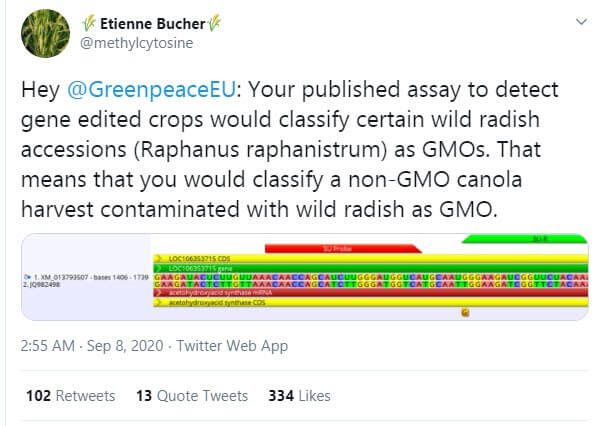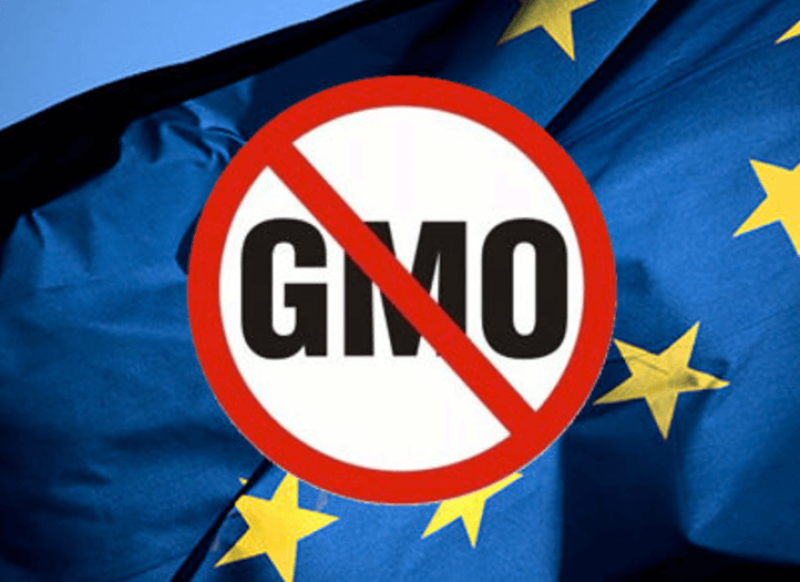A few months earlier, in July, the EU suspended some of its GMO regulations to fast track the development of a coronavirus vaccine, which some scientists believe may help Europe shake off its stubborn anti-crop biotech inclinations, especially as an immunization moves ever closer to approval.
To be sure, the EU still has an affinity for organic farming and deep-seated distrust of the biotech industry that won’t disappear overnight. But the statement from Europe’s agriculture ministers and the regulatory decision to speed vaccine development add weight to the activism of scientists, farmers and even some members of Germany’s eco-focused Green Party, who know the EU needs to shed its genetic engineering phobia if it wants to promote sustainable food production—a possibility that seemed much more distant just two years ago.
A setback for science
In July 2018, the European Court of Justice made a decision that sent shockwaves through the continent’s plant-breeding community. The court determined that crop gene editing with methods such as CRISPR/Cas9 will be subject to the same restrictions as traditional genetic modification (GMO), even though most gene-edited applications do not result in the introduction of “foreign” genes. The decision heavily restricts the crops European farmers can cultivate, and may have similar impacts around the world since many countries follow the EU’s lead on plant breeding regulation.

Crucially, the court’s ruling was not conclusive since it did not clearly define which plant-breeding methods count as gene editing. Regulatory uncertainty is typically a headache for scientists and companies trying to develop innovative tools for farmers, though in this instance it may be a blessing.
The courts open-ended decision leaves room for EU member states to interpret its practical applicability to agriculture. Combine this legal wiggle room with the fact that many EU regulators (and most scientists) have expressed support for agricultural gene editing, and you reach the conclusion that Europe’s battle over gene-editing is far from settled. The ECJ decision, rather than the death knell for crop biotech in Europe, may have been the match that sparked enough opposition to finally reform the EU’s outdated regulatory framework.
Member states speak up
Such boldness on the part of member states would not be unprecedented. In 2016, while scientists waited on a policy decision regarding NBTs, some EU Member States unilaterally decided to exempt certain gene-edited crop varieties from oversight. The Swedish Agricultural Board determined, for example, that it would not regulate some Arabidopsis plants that have been modified using CRISPR-Cas9 as genetically modified organisms, noting as we did above that inserting DNA from another species into a crop’s genome and editing its existing genes are not the same thing.
The ECJ decision temporarily overruled the Swedish decision but did not settle the broader matter of gene-editing regulation. In the wake of the court’s ruling, several EU members asked for clarification, because the ruling concerned the legal status of herbicide-tolerant seed varieties, and its general implications were not (and still aren’t) entirely clear. The primary problem is that the ruling will be difficult to enforce; there is no way to determine if a mutation in a plant’s genome was the result of intentional editing via NBTs, an older (and EU-approved) breeding technique like mutagenesis, or natural processes. Recognizing the regulatory problem this presents, Greenpeace and other anti-biotech NGOs have alleged that gene-edited crops can be uniquely “detected,” but their analysis doesn’t stand up to scrutiny.

Unsurprisingly, Sweden has been one of the more vocal member states in its requests for clarification on the ruling. The Swedish Board of Agriculture has argued that without access to the latest breeding tools, it will be even more challenging for farmers to adapt to climate change. It will take longer to obtain new cultivars engineered to withstand unforgiving weather, and growers will be forced to continue spraying pesticides when they could have grown crops bred to fight off pest attacks. Former Director-General of the Swedish National Food Agency Inger Andersson summed up the problem when he declared that
[T]he [ECJ] ruling will prevent the use of cultivars obtained with the new technologies in European farmlands, because the approval process for GM cultivars is so expensive, protracted, and politically restrained [it has been] more than ten years since a crop variety classified as genetically modified was licensed for cultivation in Europe.
Swedes are not the only Europeans who have urged the EU to reconsider its stance on genome editing. The European Sustainable Agriculture through Genome Editing (EU-SAGE) network, with members from 132 European research institutes, declared in an open letter that “developing new crop varieties [requires] tools that are safe, easy, and fast, and the latest addition to these tools is precision breeding or genome editing.” Echoing Sweden, the statement notes that gene editing offers an increasing range of solutions for more efficient selection of climate-resilient crops, and recommends that the EU endorse the technology to improve the welfare of all EU citizens.

In June 2020, Germany joined this growing chorus of scientific opposition, but vocal support came from surprising quarters. More than 20 members of the German Green party, hardly a bastion of pro-GMO advocacy, issued a statement affirming that “it is imperative to combine sustainability and new biotechnologies stemming from genetic engineering.” The statement noted Europe allows gene-editing research for biomedical applications to proceed, so why not those designed to make farming more sustainable? With “appropriate supervision,” the pro-biotech Greens argued crop gene editing could do great things for Europe, concluding that current European regulations on GMOs “no longer correspond to the current state of the science.”
The internal debate has continued since the summer, and the party as of November 19 is considering three proposals that would solidify its position on crop biotechnology: the first rejects genetic engineering; a second compromise proposal lends cautious support to gene-editing research; and a final advocates for a modern, science-driven view of genetic engineering, with more than 150 independent academics urging the Greens “not to close the door to a fact-based view of the new genetic engineering processes …. In particular, the current state of science should be recognized, further research should be made possible and therefore no release [of gene-edited crops] can be prevented across the board. ” [Editor’s note: Automated translation from Google]
European Young Farmers endorse gene-editing
The European Council of Young Farmers (CEJA), which represents the political interests of roughly two million young farmers from across Europe, declared its support for NBTs. “Ensuring that food producers are provided with the appropriate alternatives is the way to make progress,” said CEJA President Jannes Maes. “The larger you make the toolbox, the easier it is for different types of farmers to find the right tools to do their part.”
Could COVID cripple the anti-GMO movement?
The ongoing pandemic has taught us many lessons, but perhaps the most important is that science can save lives when it isn’t stifled by politically motivated regulations, such as Europe’s 20-year-old GMO rules that would have delayed the development of a COVID vaccine. In that sense, the pandemic marks the return to a scientific reality where public health policy is guided by public health experts. If consumers and policymakers recognize that doctors know more about biotech vaccines than they do, perhaps they’ll also recognize that agriculture scientists know more about GM crops than they do.
This won’t happen immediately, but a genetically engineered vaccine could slowly shift how the public thinks about biotechnology. Historically, the anti-GMO movement has viciously fought the idea that mainstream science can be trusted, especially research funded and conducted by biotech companies. However, as firms like Pfizer and Moderna utilize biotechnology to hopefully bring the pandemic to an end, GMO skeptics may be sidelined, microbiologist Alex Berezow recently pointed out:
Like all conspiracy theorists, [anti-GMO groups] just won’t go away. But now it appears that they have been marginalized thanks to companies like Pfizer and Moderna, which are using biotechnology to help rescue us from the COVID pandemic. Both companies are using RNA (which has been genetically edited or modified in some way) as the key ingredient in their coronavirus vaccines.
The recent news that their vaccines are 90% and 95% effective, respectively, means that biotechnology is a savior of humanity rather than a horseman of the Apocalypse. This is obviously bad news for people who make a living by telling people that science is scary.
Dr. Volker Wissing Minister of Economics, Transport, Agriculture and Viticulture in Germany’s Rhineland-Palatinate region made a strikingly similar point during a November 19 parliamentary debate over the future of genetic engineering in the country. The rapid development of COVID vaccines shows the “steadily growing possibilities of biotechnology and especially of genetic engineering,” the minister said, referencing future biotech applications in agriculture and medicine. “The discussion about genetic engineering must no longer be narrowed down to the risks …. Further research should not simply be restricted. On the contrary: innovations are needed – not least in order to remain competitive as an export nation.” [Editor’s note: Automated translation from Google]
Time for new gene-editing regulations
What all of this illustrates is that Europe’s outdated, unscientific policy on genetic engineering needs reforming. The path forward will be long and complicated (bureaucrats and politicians rarely move quickly), but science-based legislation that provides legal certainty on biotech crops would spur investment in important plant-breeding projects (like climate-resilient crops) and allow EU farmers and consumers to benefit from the latest technology.
The Commission could start by appointing regulators with the expertise to evaluate new crop varieties on a case-by-case basis to determine which ones count as “GMOs” according to the EU’s Directive 2001/18/EU. The alternative is to create another expensive system of patchwork regulation that reinforces the mistakes Europe made when it enacted GMO regulations based on disinformation spread by anti-biotech NGOs. Such an approach to gene editing would only benefit the largest biotech companies, which have the financial resources to navigate the regulatory morass, and restrict the tools farmers can use.
As Sweden’s Andersson remarked, there are reasons to worry about the long terms effects this regulatory approach could have on EU agriculture. Since these new technologies are being employed in other parts of the world, farming in Europe risks becoming less and less competitive. The “European Commission has many other important issues to deal with,” he noted, “but a thorough modernization of the legislation on plant breeding cannot wait any longer.”
Luis Ventura is a biologist with expertise in biotechnology, biosafety and science communication, born and raised in a small town near Mexico City. He is a Plant Genetic Resources International Platform Fellow at the Swedish University of Agricultural Sciences. Follow him on Twitter @luisventura































